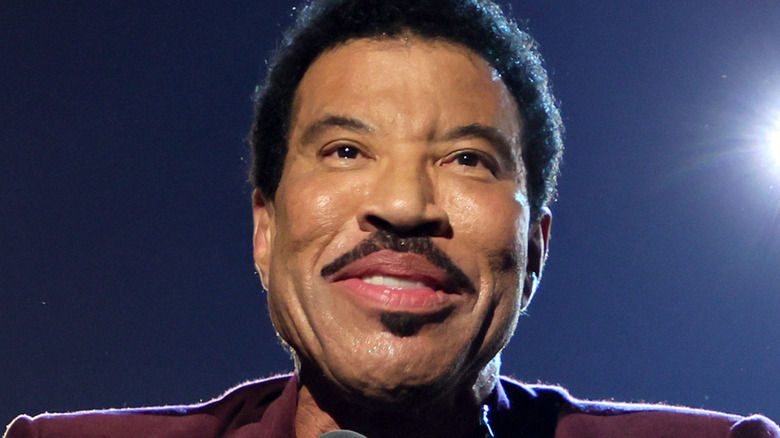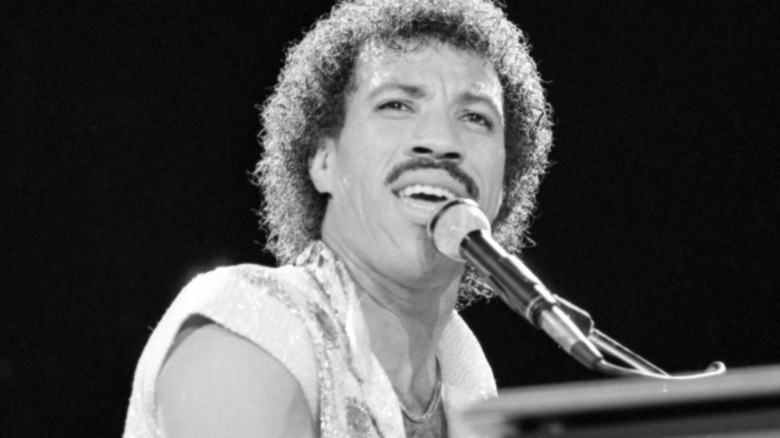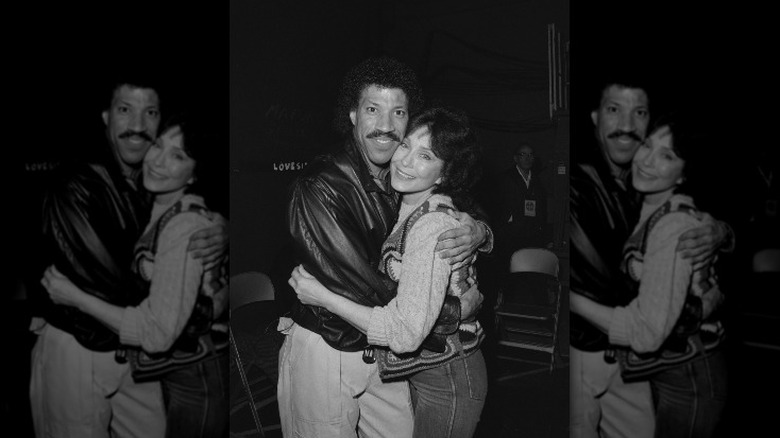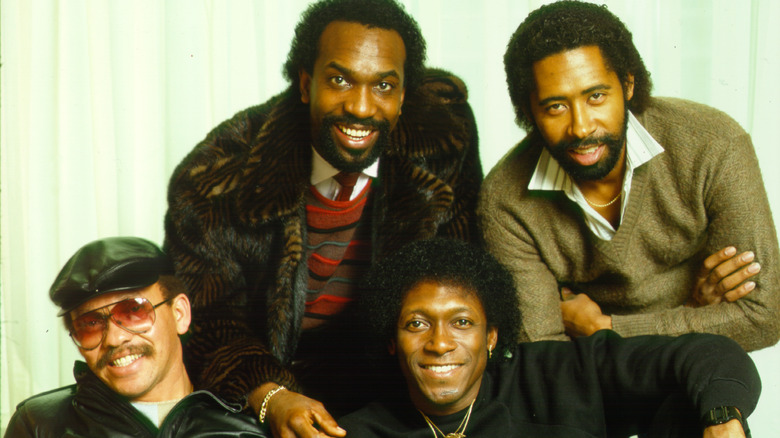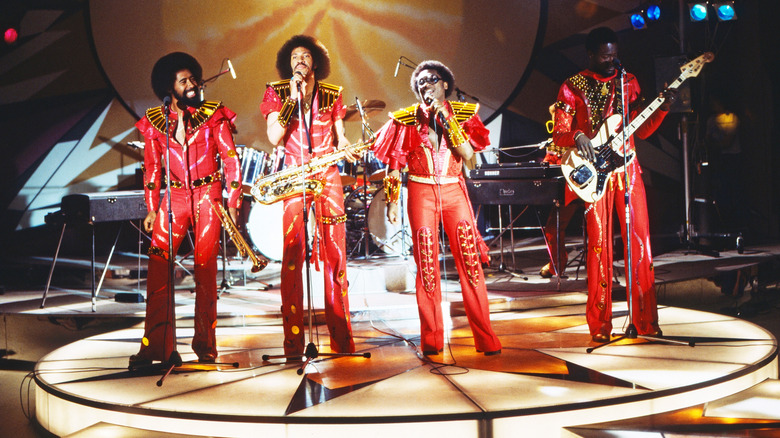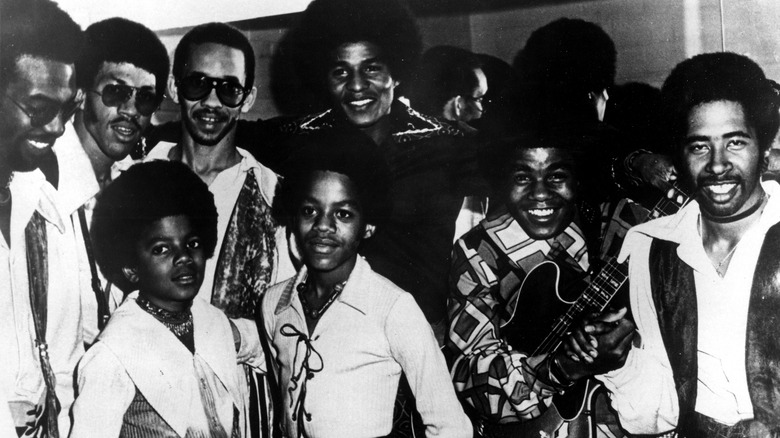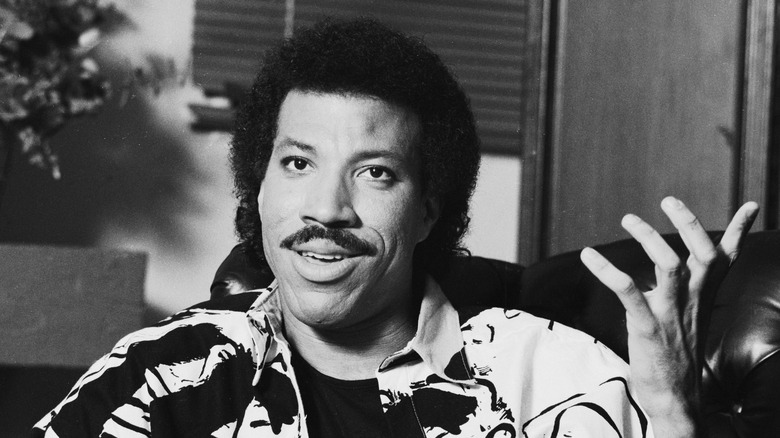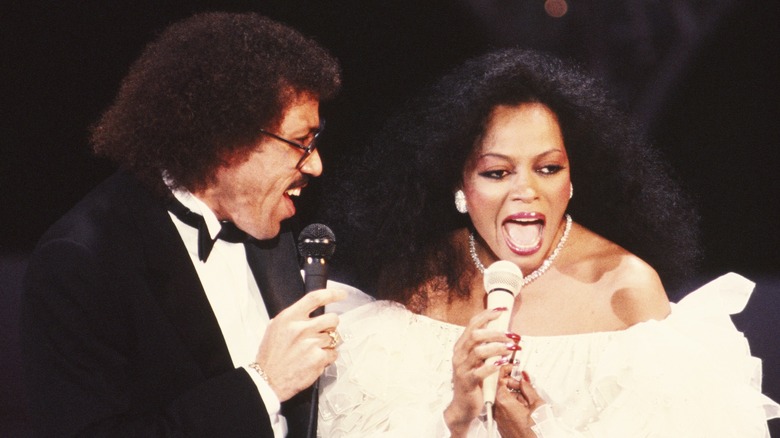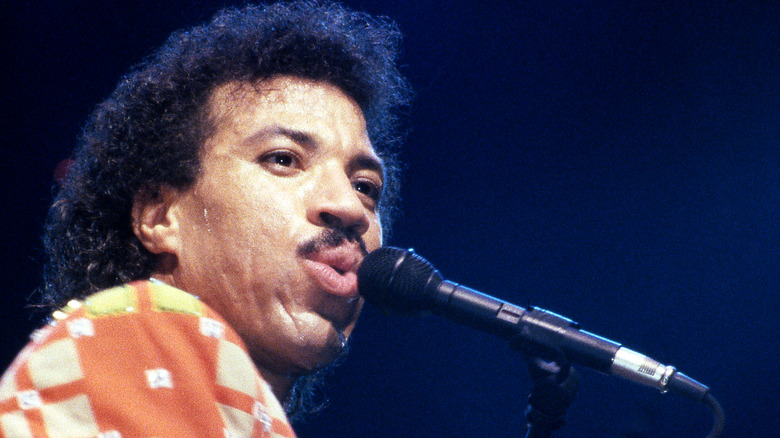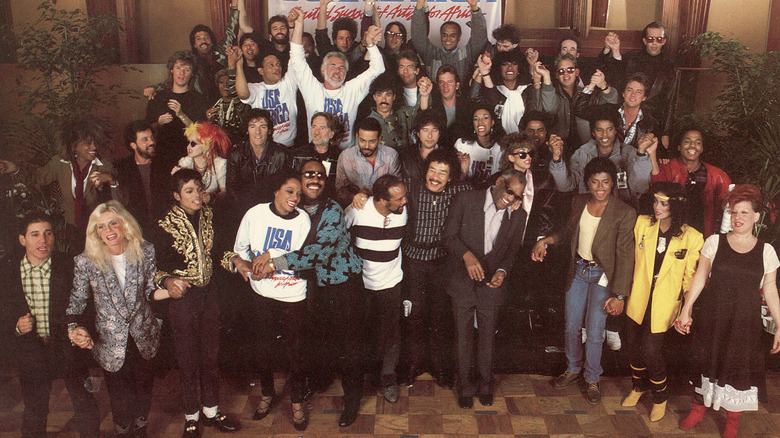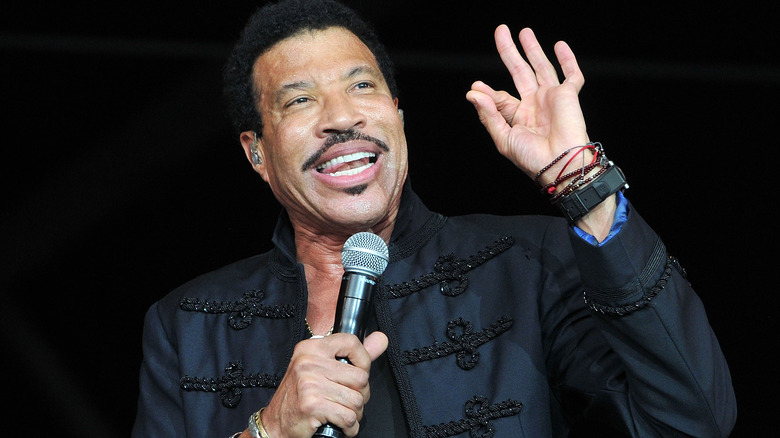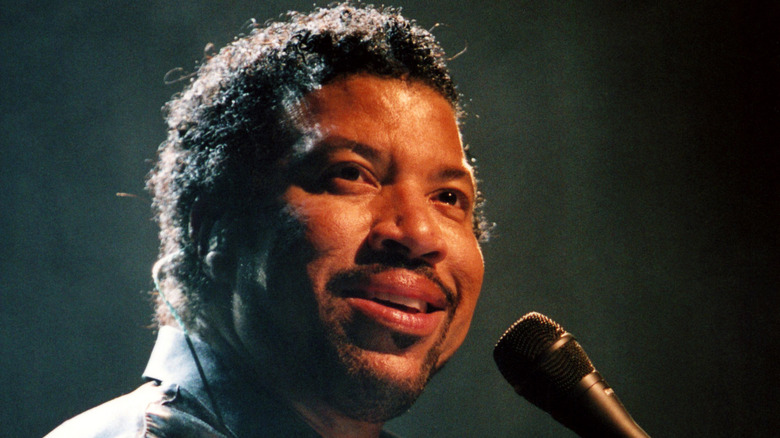Lionel Richie's Rise To Fame
It's hard to make it in any branch of show business. The right combination of talent, business savvy, and luck has to come together for anyone to make it big as an actor, author, filmmaker, or musician. And if success is achieved, the conditions under which it was won can stymie a career. If a singer-songwriter comes to prominence as part of a group, for instance, they may be unable to divorce themselves from their association with that group when they try to strike out on a solo career.
Lionel Richie has managed to beat all the odds. From a childhood in Tuskegee, Alabama, he managed to establish a presence in the music industry; he specifically rose to fame as a singer and songwriter for the funk group the Commodores, and he became a headline act in his own right when he set out on a solo career. Per Britannica, his ballads, including "Three Times a Lady," were some of the Commodores' biggest hits. Such ballads served him well when he was on his own, as did duets like "Endless Love" with Diana Ross. His 1985 collaboration with Michael Jackson and others, "We Are The World," won the Grammy for song of the year.
While Richie's career has slowed in recent years, he continues to receive recognition. He's been inducted into the Songwriters Hall of Fame, granted an honor from the Kennedy Center, and was inducted into the Rock and Roll Hall of Fame in 2022.
Lionel Richie comes from a musical family
Lionel Richie was born in Tuskegee, Alabama, on June 20, 1949. Per Britannica, he spent much of his childhood in the care of his maternal grandparents. The family had worked for generations at the Tuskegee Institute (later named Tuskegee University), and their home was on campus, according to All Music. Richie told US Weekly for an entry in their "25 Things You Don't Know About Me" series that his grandparents' house was gifted to them by Booker T. Washington.
Richie was exposed to music from a young age. His grandmother was a classical pianist and his uncle arranged music for big band jazz. From the former, Richie was introduced to the fundamentals of music and classical composition; from the latter, he received his first saxophone, and he went on to be a saxophonist in his early music career. Situated as he was in the American South, Richie also absorbed influences from country music, the gospel songs of his church, and a wide range of African American musical traditions.
All this exposure to various musical traditions offered a wonderful education throughout Richie's upbringing. However, he has never mastered a particular aspect of songwriting. One of the facts he included in his list to US Weekly is that he cannot read or write sheet music.
He almost went into the priesthood
Although Lionel Richie was raised around music and took to it at a young age (per Britannica), it wasn't his first choice for a profession. He was attracted to the ministry. His religious interests influenced his musical tastes; gospel was a favorite in his youth. When he enrolled in Tuskegee University, Richie told People Magazine, it was with serious thought toward becoming an Episcopal priest.
Things changed when Richie fell in with his musically-inclined friends. Through meetings on campus, he and other young men came together to form the funk and soul group Commodores. According to Richie, the first time the group performed, the girls in the crowd went wild. It was a new experience for Richie, who had never before been involved in activities that got such a reaction out of the opposite sex. "It was right after those girls screamed," he told People, "I remember saying to myself, 'I don't think I'm gonna be priest material.'"
Richie's newfound pursuit of music, and a trendy sort of music at that, was a bit of a shock to his academically-inclined family. His father, a former systems analyst for the US army, didn't understand his son's funk sound or trendy sense of style when he came home. "You could imagine what he was saying to me at that particular time," Richie said to People of his father, but he persisted in his new interest.
Lionel Richie started small with the Mystics
While studying at Tuskegee University, Lionel Ritchie got together with William King and Thomas McClary to form a band for a college talent show (per the Montreal Gazette). They called themselves the Mighty Mystics and found that playing for campus parties got them in good with the ladies. Richie's role in the Mystics, per Britannica, was as a saxophonist and composer. He did some singing, but he wasn't the lead vocalist.
The Mystics weren't the only band on the Tuskegee campus in the late 1960s. There was also the Jays, formed by Milan Williams. Between the two groups, there was only one music major, Walter Orange; the rest were accounting, business, architecture, and engineering students. But the bands came together to make funk and rhythm-and-blues, and Richie stepped up to lead singer after the merger. Trumpeter William King told People that the name of the new group came about by chance; he opened the dictionary and picked a name at random.
Campus parties and talent nights won the newly christened Commodores a dedicated following in Tuskegee. They deliberately cultivated a versatile sound that would have wide appeal in an era where segregation still lingered. Eventually, Richie and the others felt confident enough from their local performances to try their luck in New York City.
A planted crowd brought the Commodores a break
Success in one's hometown can give a musical act confidence, but it doesn't always lead to a breakthrough into a larger market. Lionel Richie and the Commodores made a splash in the local area around the Tuskegee University campus where they first came together (per the Montreal Gazette), but when they decided to try their luck on the New York scene, they hit a roadblock. They had a chance to perform at the famous Smalls Paradise nightclub in Harlem, but according to All Music, the club owner made it clear to the young newcomers that he didn't care for their sound.
Luck threw the Commodores a break when a last-minute cancellation forced the owner to reconsider and book them in. The group decided not to leave a potentially pivotal moment in their careers entirely to chance. They arranged it so that the crowd in Smalls Paradise that night was stuffed with friends and family who happened to be in the New York area. This planted audience duly gave the Commodores a warm reception. The club owner, unaware of the subterfuge, was sufficiently impressed that he kept the band on for two weeks.
From an opening act to headliners
A lucky break and a planted crowd helped the Commodores break into the music scene in New York City (per All Music). After growing their name in that market, the band successfully auditioned for a support slot. That support slot happened to be opening for the Jackson 5. For two years, the Commodores provided the Jacksons with their lead-in, and they picked up plenty of attention in their own right.
Among those who took notice of the Commodores was the record label Motown. They offered the group a contract in 1972. Although they signed, the Commodores refused Motown's recommendations for producers and music. They wrote their own album, "Machine Gun," and the titular instrumental dance track was an instant hit in 1974.
"Machine Gun" was written by keyboardist Milan Williams. But as the Commodores continued to turn out albums for Motown, Lionel Richie emerged as the most prolific songwriter of the group as well as their lead vocalist. Guitarist Thomas McClary, who also penned a lot of tracks for the group, told the Montreal Gazette that he and Richie were often compared to John Lenon and Paul McCartney of the Beatles.
Lionel Richie's personal fame led to tensions within the Commodores
The Commodores were established as a democratic group, according to All Music, and they kept things that way throughout the 1970s. The band's signature tune, "Brick House," started as an idea by drummer Walter Orange and was developed by all six members (per Alabama.com). But many of their biggest hits were ballads written or co-written by Lionel Richie. "Three Times A Lady" and "Still" were the Commodores' only No. 1 pop hits, and "Easy" did good business.
The success, and the sheer number of songs Richie wrote for the Commodores, led to him being singled out in the press. The Montreal Gazette's write-up on the band in 1980 is a typical example. While other members are named, Richie comes in for special attention. He was named the one person most responsible for the Commodores' success. Richie spread the credit around when speaking to the Gazette, but this sort of coverage, and the increasing time he spent on projects outside the Commodores, led to tensions within the band.
In 1981, Richie took what he and the Commodores assumed would be a temporary leave of absence to pursue ventures as a solo artist. It became a permanent split. Trumpeter William King complained to the Los Angeles Times that Richie had strung his bandmates along for a year. For his part, Richie insisted that he always meant to return but found the freedom of a solo career too tempting.
He was a songwriter for other acts before becoming a solo performer
Lionel Richie's road to a solo career began while he was still a member of the Commodores. It was his stints away from the band, according to the Los Angeles Times, that made him realize that he wanted to be on his own. His first foray outside the band came in 1980. Per Britannica, he was recruited by country singer Kenny Rogers to write and produce the song "Lady." Richie told People that "Lady" was originally written for the Commodores, but they passed on it and recommended that Richie pass it on to Rogers. The song was a hit, and Richie and Rogers became lifelong friends.
The follow-up to Lady was "Endless Love" in 1981. This time, Richie would sing as well as write; the song was a duet between him and soul artist Diana Ross, written as the title theme for Franco Zeffirelli's movie of the same name (per People). It was another success, and Richie's next step was his own self-titled album. Released in 1982, it was one more triumph for Lionel Richie. The single "Truly" topped the charts according to Biography. The album was also the final break between Richie and the Commodores. From then on, he was on his own.
Lionel Richie won Grammys and Oscars as a solo artist
Some singer-songwriters who break away from a band struggle with their solo careers. For Lionel Richie, success came fast. His self-titled album in 1982 included three hit tracks, including the No. 1 single "Truly" (per Biography). Richie followed its success with two more albums, "Can't Slow Down" in 1983 and "Dancing on the Ceiling" in 1986. The former remains one of the best-selling albums in Motown's catalog, according to Britannica.
Besides good sales, Richie picked up industry accolades for his work. "Can't Slow Down" won the Grammy for Album of the Year, and he was asked to sing the dance song "All Night Long" at the closing ceremony for the 1984 Olympics. A song he wrote for the 1985 film "White Nights," "Say You, Say Me," won the Oscar that year. It also spawned a popular music video.
Looking back at Richie's solo career, Cleveland.com noted how reserved Richie could appear at first glance, compared with his contemporaries in the pop charts of the 1980s. Michael Jackson, Prince, and Madonna were all more flamboyant in their fashion and their stage personas. Yet Richie, with a more ordinary personal style and demeanor, held his own in the music world throughout the decade.
We Are The World made $50 million for charity
Between studio albums, Lionel Richie found time for a unique project in 1985. The year before, the British charity supergroup Band Aid released "Do They Know It's Christmas?" to call attention to the famine in Ethiopia and raise relief funds. The Chicago Tribune reported that the record raised $9 million in aid. It also caught the attention of singer and activist Harry Belefonte. He spoke with music manager Ken Kragen about putting together a comparable effort among American artists.
Kragen approached Richie, Stevie Wonder, Kenny Rogers, Michael Jackson, and Quincy Jones about coming up with a charity song, with the initial thought being that Richie and Wonder would collaborate on the writing. But when Wonder couldn't be reached, Jackson volunteered his services. He and Richie came up with "We Are The World."
The song was recorded by the supergroup USA for Africa, comprised of 45 different artists. Besides Richie, Jackson, Wonder, Rogers, Jones, and Belefonte, contributions came from Brue Springsteen, Ray Charles, Cyndi Lauper, and Tina Turner, among others. Richie and Jones took steps to head off any clash of egos, but the Tribune reported that the recording session was a happy affair. According to Britannica, "We Are The World" won the Grammy for Song of the Year in 1985, and the record raised $50 million in famine relief.
Lionel Richie chose to slow his career down
Success was fast and relentless for Lionel Richie in the 1980s. In his transitional period from member of the Commodores to solo star, he told People that the experience of fame and fortune was like revving a car up from 30 miles per hour to 160. Even at that stage in his career, he worried about moving too fast and facing burnout. Opportunities to write for other artists came his way, but he turned down even lucrative assignments like Kenny Rogers' Christmas album to focus on his own material.
By 1987, according to All Music, Richie had been in the business for 20 years and had matched Irving Berlin's record of turning out at least one hit single a year nine years in a row. Whether with the Commodores or on his own, he'd toured and performed on top of writing and recording during all that time. Burnout finally reached him. His father also took a turn for the worse. Richie deliberately withdrew from the music scene to care for his dad.
When Richie did get back into the game, it was at a more relaxed pace with fewer smash hits. He adjusted his sound for 1996 with the album "Louder Than Words," which found a modest reception. Later releases found more success overseas than in America. But Richie remains active. He began his first tour in a decade in 2013, and he's one of the judges on a revival of "American Idol."
His songs were used to communicate friendliness in the Iraq War
Lionel Richie's career may have slowed down by design, and his record sales in the United States may be tamer than it once was (per All Music), but in the early 2000s, his popularity in another part of the world lent a hand to diplomacy. Richie has a glowing reputation in the Arab world. He's performed in Morocco, Dubai, and Qatar in the course of his career. A concert in Libya coincided with the 20th anniversary of America's bombing of the country (per NPR). Richie is well aware of his popularity in the Middle East, he told ABC News in 2006, but has no idea why.
Richie's popularity extends to Iraq, and it's there that his music came into diplomatic matters. He told GQ in 2018 (via YouTube) that he had been told by a U.S. commander that, during the Iraq War, civilians wanted to indicate that they were friendly to Americans. Many played Richie's song "All Night Long" as a sign of welcome. U.S. forces, also eager to show goodwill, played Richie's "Dancing on the Ceiling" as they approached.
